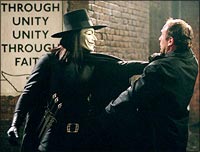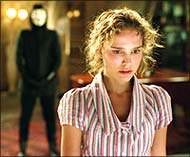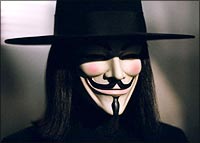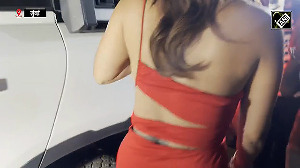 Despite wanting to have nothing to do with the film, Alan Moore will no doubt be dragged out in every discussion of the film, and the ideas penned by him dissected for the pop culture machine.
Despite wanting to have nothing to do with the film, Alan Moore will no doubt be dragged out in every discussion of the film, and the ideas penned by him dissected for the pop culture machine.
Fairly too, as the history of the film actually begins in England, in 1981, where V For Vendetta made its début in Warrior magazine as a few pages of an exciting new comic series. It wrapped up around 1988, after a change of publisher (Vertigo), and subsequent culmination as a collected trade paperback. Set in 1997, Moore's story tells of a future dystopia where an oppressive government is brought to its knees by a vigilante in a Guy Fawkes mask, who goes simply by the name, 'V.'
When the paperback was published, Margaret Thatcher's Conservative government was entering its third successive term. In an introduction to the paperback, Moore drew a dismal picture of 1988 England, claiming his work was not very far from depicting the future of his country, writing that 'the government has expressed a desire to eradicate homosexuality,' and that, 'the new riot police wear black visors, and their vans have rotating video cameras mounted on top.'
The comic obviously has shades of George Orwell's 1984; some may even go as far as calling it an updated version of the seminal book. In which case, it is fair to call the film an updated version of the comic. Apart from the protagonist (Hugo Weaving), V For Vendetta is also the story of Evey (Natalie Portman), a hapless girl who is gradually, meticulously turned into a hardened revolutionary by V.
The story moves through a host of characters, the lives and deaths of whom we are shown as a macabre symphony that is created out of a brewing revolution, the work of Codename V.
V's fight changes from being a personal vendetta against his erstwhile captors and torturers to an instigated anarchical revolution against an equally captive and tortuous government led by the power hungry and hate-mongering Chancellor (John Hurt).
 In the film, apart from minor changes, tons of sub-plot and back story are removed, both to simplify the narrative, and to trim the story to feature-film length. While it can not be complained that the film makes place for cheap action set pieces and compromises the said subplots, it is also largely a debatable issue whether the film manages to capture the heart of the comic.
In the film, apart from minor changes, tons of sub-plot and back story are removed, both to simplify the narrative, and to trim the story to feature-film length. While it can not be complained that the film makes place for cheap action set pieces and compromises the said subplots, it is also largely a debatable issue whether the film manages to capture the heart of the comic.
More importantly, if the outlying message of the comic was more important than faithfulness to the story, has first-time director James McTeigue succeeded?
The film obviously updates the timeline of the comic. But it also changes the backstory leading to a totalitarian government to make more sense in this day and age. Moore himself opined that his naïvete led him to suggest then that a nuclear war was survivable, which he later agreed was not the case.
The film changes the world-changing event to a bio-terror attack that leads to death of thousands and subsequent public panic. In doing so they create a bogeyman, the Chancellor, who takes advantage of the situation and leads himself to absolute power and dominance. It is the need of the film to create such an obvious Good Guy vs The Bad Man situation that is most unpalatable.
Of course, the fascist leader had a face in the comic as well, but the focus was not his villainy but the society that put itself in such a situation that it was manipulated by corrupt leadership. Not that such bad choices abound in the film -- the decision to change Lewis Prothero as a commanding voice on the radio to an influential orator on the telly (Roger Allum) was an obvious, yet inspired one.
The comic was created in a time before satellite television and the Internet, and the freedom that readily available knowledge and constant communication brings was unheard of. The film tries to update that with a broadcast network that controls the airwaves and a society that sits transfixed and watches the television all day. The question of the power of Internet is not raised, though the collapse and subsequent untouchable status of the 'Ulcered
This is an interesting point. Society in general is lamented to be too solipsistic, and at the same time the Wachowski brothers (Matrix-makers Andy and Larry, credited with writing the screenplay) imagine a world brought down by the curtailing of freedom of choice through monopolisation of television. V is portrayed as the voice that shakes people into action within a year, and the lone Good Guy who stands up against The Bad Man.
V's portrayal as an enigmatic terrorist fighting the fascist State is bang on, however. Credit should go to Weaving, who turns up such a powerful and presence-filled performance behind a mask that the character may go down in the same cinematic hall of fame as a certain Mr Vader.
Portman plays her role as a transformed woman with searing intelligence, and you're in love with the character by the end of the film. The story is changed here a bit too; she portrays a not too worldly-wise television intern as opposed to a naïve, desperate girl who tries to turn to prostitution.
While the film version of Evey's character gives her less teeth to make her more palatable, Portman manages to create a character that is so wholly original and completely strong that you almost don't remember the details that were changed.
That is also because the essence of her character is the trial by fire that breaks and reconstructs Evey, which is intact in the film, and kudos to McTiegue to remaining so staunchly steadfast during that sequence.
And that's what works the best in the film. The essence of a revolution as people coming under a banner, as an idea is well represented. The film takes liberties with the comic, sure, but it manages to create a voice of it's own, a science fiction mirror that makes society cringe to look at it.
The said liberties may change a host of little details and meandering character sub-plots, but the streamlined version manages to recreate a lot from the comic in fantastic visual and spiritual detail. The art direction is a bit reminiscent of the Christian Bale starrer Equilibrium, but seeing as it was inspired in no small amount by The Matrix, I guess they have come a full circle with that.
X-Men 3: Pix from the comic book multistarrer!
 Coming back to my earlier question: Does the director manage to recreate the spirit of the comic on screen? Maybe the message of the comic has changed, maybe the discussion of human emotions and the human condition is no longer relevant. The film has a spirit of its own, one that is so strong that even a purist has to take notice, and cease complaining after a time.
Coming back to my earlier question: Does the director manage to recreate the spirit of the comic on screen? Maybe the message of the comic has changed, maybe the discussion of human emotions and the human condition is no longer relevant. The film has a spirit of its own, one that is so strong that even a purist has to take notice, and cease complaining after a time.
Parallels to Rang De Basanti are inevitable here the film is targeted at a generation whose apathy and irritability makes this film meaningful. The generation that will discuss the theory of the film's protagonist enthusiastically, agree that something needs to be done, and then go back to their blogs and coffee bars and iPods.
In the end, it all comes own to what you understand from the comic, and what message the film holds. They are equally powerful and provocative, even if they may be cousins to each other. I urge you to ignore every review and go watch this film.
You are a generation bred on Cliff Notes and director's commentaries and forums and Wikipedia. You need to make up your own damn minds.
Rediff rating: 






 © 2025
© 2025